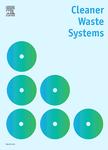版权所有:内蒙古大学图书馆 技术提供:维普资讯• 智图
内蒙古自治区呼和浩特市赛罕区大学西街235号 邮编: 010021

作者机构:Covenant Univ Dept Civil Engn PMB 1023 Km 10 Idiroko Rd Ota Nigeria Delta State Univ Dept Civil & Environm Engn Abraka Nigeria
出 版 物:《CLEANER WASTE SYSTEMS》 (Clean. Waste. Syst.)
年 卷 期:2023年第5卷
基 金:Covenant University Centre for Research Innovation and Development for the favorable environment
主 题:Cancer Machine learning algorithm Radioactivity Recycling Sustainable production Waste management
摘 要:Recycling improves the circular economy and resource sustainability by using agricultural waste to create new products. However, agricultural byproducts resulting from the recycling of agricultural waste materials contain naturally occurring radionuclides with potential risks to human health and the environment. Therefore, this article provides an overview of relevant literature on radiological properties of agricultural byproducts (rice husk ash, mussel shell, palm oil clinker, and palm oil fuel ash), prioritizing their specific activities (226Ra, 232Th and 40K). Consequently, absorbed gamma dose rates (AGDR), annual effective dose rates (AEDR) and excess lifetime cancer risks (ELCR) of the agricultural byproducts studied were determined. The specific concentrations, AGDR, AEDR, and ECLR were trained, validated, and tested using various machine learning algorithms. An evaluation of the radiological properties of all agricultural byproducts examined revealed that they pose no risk of cancer. Additionally, compared to support vector machine, regression trees, ensemble trees, Gaussian process regression, and neural networks, linear regression yielded the best performance metrics, making it the most suitable technique for predicting excess lifetime cancer risks of the surveyed agricultural byproducts.